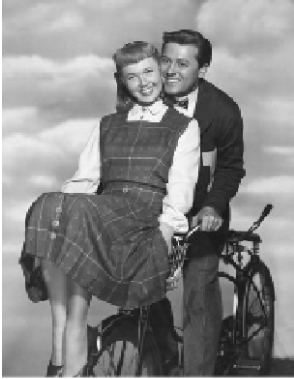|
Doris Day and Gordon Macrae |
|
|
Doris Day was born on April 3, 1922, in Cincinnati, Ohio. She sang with several big bands before going solo in 1947. In the 1950s, she made a series of popular film musicals, including Calamity Jane (1953) and The Pajama Game (1957). Day is an advocate for animal welfare and founded several organizations devoted to the cause. A top film star of the 1950s and 1960s, Doris Day is best known for her work in such films as The Pajama Game (1957), Pillow Talk (1959) and That Touch of Mink (1962). The Hollywood star started out as a dancer and turned to singing after injuring her leg in a car accident as a young teen. Born Doris von Kappelhoff, Day studied ballet and tap dance growing up. She even won a local dance contest with her partner Jerry Doherty in her early teens. But her dreams of dancing professionally were shattered along with her leg in a 1937 car accident. The daughter of a music teacher, Day started taking voice lessons during her recovery. Ella Fitzgerald was one of her early inspirations as she developed her own vocal style. Day's first singing performances were on local radio programs. She also sang with bandleader Barney Rapp and his group for a time. Rapp encouraged her to adopt a stage name, and she changed her last name to Day after the song "Day After Day." In 1940, Day landed a spot as a vocalist with the band led by Bob Crosby- Even during her acting career, Day found time for music projects as a solo artist. She scored another hit in 1948 with "Love Somebody," a duet with Buddy Clark. In the 1950s, Day reached the charts with such songs as "My Love and Devotion" (1952) and "Let's Walk That- https://www.biography.com/people/doris- Albert Gordon MacRae was born on March 12, 1921, in East Orange, NJ. During his early years, he resided in Syracuse, NY, and, while in high school, spent much of his time singing and acting in the Drama Club. It was also during this time that he learned to play the piano, clarinet and the saxophone. At 19, he entered a singing contest and won a two- He made his Broadway debut in a show called "Junior Miss", as a replacement in the role of "Tommy Arbuckle". Next, he appeared, again on Broadway, in Ray Bolger's 1946 revue, "Three To Make Ready". It was here that he was spotted by Capitol Records and signed to a long- What followed was a string of hit musicals, starting with Look for the Silver Lining (1949), in which MacRae had a featured role opposite June Haver and Ray Bolger, and five fondly remembered films with Doris Day, beginning with Tea for Two (1950). Perhaps his two best and well- MacRae began to suffer, in the late 1950s and early 1960s, from bouts of heavy drinking and, by his own admission, developed into an alcoholic. He revealed that he had been "picked up for drunk driving" during the filming of "Carousel". He conquered the disease in the 1970s and went on to counsel other alcoholics. He continued recording and performing on dozens of television shows. He and his wife, Sheila MacRae, appeared together frequently and even released an album together. His daughters, Meredith MacRae and Heather MacRae, acted in films and on TV. On September 22, 1974, he appeared as a sheriff on an episode of McCloud (1970), starring Dennis Weaver, entitled "The Barefoot Girls of Bleeker Street". His final film came in 1979, a fine dramatic role in The Pilot (1980), which starred Cliff Robertson. He suffered a stroke in 1982. He continued on with the support of his second wife, Elizabeth, and his five children. This brilliant performer continued to tour, when his health would permit, allowing audiences to relive some of his biggest film hits. On January 24, 1986, Gordon MacRae died at the age of 64, at his home in Lincoln, NE, of pneumonia, the result of complications from cancer of the mouth and jaw. - |
|
|
|
 Home
Featured Artists
Schedule
Space Age Pop Music
About EZMax
Radio Max Music Home
Home
Featured Artists
Schedule
Space Age Pop Music
About EZMax
Radio Max Music Home



 Doris Day was a singer and actress most popular in the 1950s and early-
Doris Day was a singer and actress most popular in the 1950s and early-